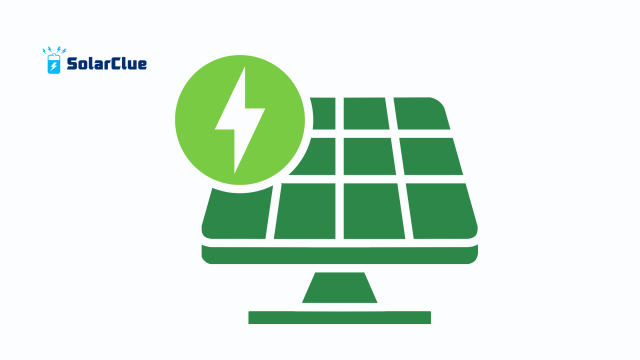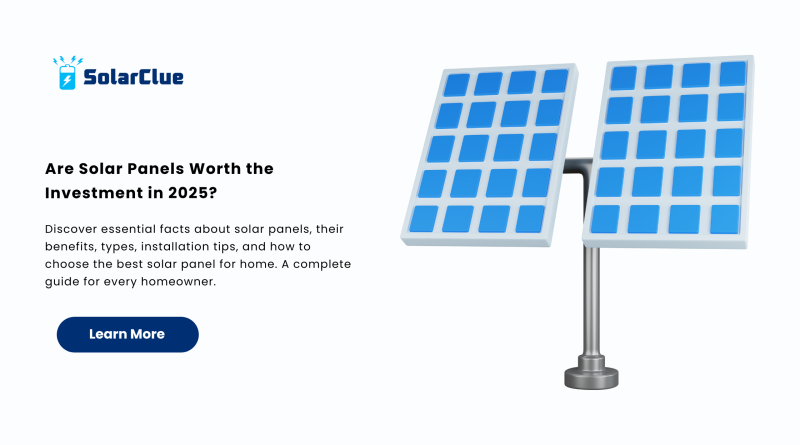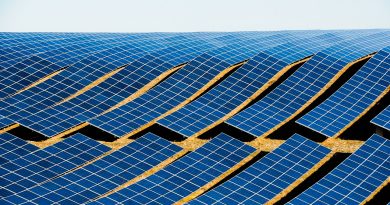Are Solar Panels Worth the Investment in 2025?
As energy costs continue to rise and environmental awareness deepens, many homeowners in India are asking the big question: Are solar panels really worth the investment in 2025? It’s not just about saving on electricity bills anymore—it’s about long-term sustainability, financial independence, and contributing to a cleaner planet. But before making a big financial decision, it’s natural to weigh the pros and cons. In this blog, we’ll break down everything you need to know to decide whether installing a solar panel for home is the smart move this year.
Table of Contents
- 1 Understanding the True Cost of Solar Panels in 2025
- 2 Why Solar Panels Are a Smart Investment in 2025
- 3 Breaking Down the Financial Returns
- 4 Technological Advancements in 2025
- 5 Common Concerns Debunked
- 6 When Solar May Not Be Worth It
- 7 Tips for Choosing the Best Solar Panel in 2025
- 8 The Future of Solar in India
- 9 FAQs
Understanding the True Cost of Solar Panels in 2025
The initial cost of installing a solar panel system is often the biggest hurdle for most people. In 2025, prices have become more competitive than ever, thanks to technological advancements and government incentives. The average cost of a 3kW system suitable for an average Indian household ranges between ₹1.2 lakh to ₹1.5 lakh after subsidies.
But it’s not just about upfront costs—solar is an investment. A well-installed best solar panel system can last over 25 years, giving you free electricity for decades. This means that you can recover your investment typically within 4 to 6 years, and everything after that is profit.
Why Solar Panels Are a Smart Investment in 2025
Solar panel benefits go far beyond just cutting electricity costs. Here’s why investing in solar this year makes sense:
-
Reduced Electricity Bills: With electricity tariffs on the rise, generating your own power protects you from future price hikes. A 3kW system can save up to ₹2,000–₹3,000 per month on your bill.
-
Government Subsidies: The Indian government continues to offer up to 40% subsidy on residential rooftop solar systems under the PM-Surya Ghar Yojana.
-
Increased Property Value: Homes with solar systems are more attractive to buyers, often commanding a higher resale value.
-
Eco-Friendly Energy: Switching to solar significantly reduces your carbon footprint. It’s your personal step towards fighting climate change.
Breaking Down the Financial Returns
Let’s say you install a 3kW solar panel for home in Bangalore. Here’s a simple breakdown:
-
System cost after subsidy: ₹1,30,000
-
Monthly savings: ₹2,500
-
Annual savings: ₹30,000
-
Payback period: Approximately 4.3 years
-
System lifespan: 25 years or more
Over 25 years, you could potentially save over ₹6 lakhs on your electricity bills. That’s a solid return on investment by any standard.
Technological Advancements in 2025
The best solar panel technologies in 2025 are more efficient, durable, and aesthetically appealing. Newer models come with:
-
Higher conversion efficiency (up to 22%)
-
Better performance in low-light conditions
-
Durability to withstand extreme weather
-
Smart monitoring apps to track power generation and usage
These improvements make solar more reliable and user-friendly than ever before.
Common Concerns Debunked
Many people hesitate because of concerns like “What if it rains or is cloudy?” or “What about maintenance?” Here’s the truth:
-
Cloudy weather still generates electricity—panels can work at 10-25% efficiency even on overcast days.
-
Low maintenance: Just cleaning the panels once every 2-3 months is usually enough.
-
Warranties and support: Most brands offer 25-year performance warranties and 10–12-year product warranties.
When Solar May Not Be Worth It
While solar panels are a great option for most homes, there are a few exceptions:
-
Limited rooftop space or heavily shaded areas may reduce efficiency
-
Very low electricity bills (below ₹1,000 per month) may not justify the investment
-
Frequent relocation or lack of homeownership can make long-term returns impractical
However, even in such cases, solar can still be explored through shared or community solar options.

Tips for Choosing the Best Solar Panel in 2025
-
Check for certifications like MNRE approval and BIS standards.
-
Choose Tier-1 solar panel brands known for high efficiency and long warranties.
-
Compare product and performance warranties.
-
Go for experienced installers with proper support and maintenance services.
-
Use net metering to sell excess electricity back to the grid.
The Future of Solar in India
India’s solar capacity is expected to reach 280 GW by 2030. With smart grids, battery storage, and electric vehicles entering the mainstream, solar will become an even more crucial part of everyday life. By installing solar today, you’re future-proofing your home for the energy revolution.
FAQs
1. Are solar panels really effective in cities with high pollution like Delhi or Mumbai?
Yes, while pollution can slightly reduce efficiency, solar panels still generate substantial electricity even in urban areas with haze or smog.
2. Do solar panels work during a power cut?
Grid-tied systems stop working during power cuts unless paired with a battery. Hybrid or off-grid systems can provide backup during outages.
3. How long do solar panels last in Indian weather?
Most best solar panel models are built to last 25 years or more and are tested for harsh climates, including heat, monsoon, and dust storms.
4. Can I completely eliminate my electricity bill with solar?
Yes, if your solar panel for home system is sized correctly and you’re using net metering, you can achieve zero or even negative bills.
5. What is the maintenance cost of solar panels?
Very low. Mostly just periodic cleaning and inverter servicing. Annual maintenance costs may range from ₹1,000 to ₹2,000.
So, are solar panels worth the investment in 2025? Absolutely—if you value long-term savings, energy independence, and sustainability, there has never been a better time to go solar. From reducing your bills to making your home future-ready, solar power offers unmatched value.
Ready to explore solar for your home? Visit solarclue.com or read more expert insights at blog.solarclue.com and take your first confident step toward a cleaner, smarter future.




